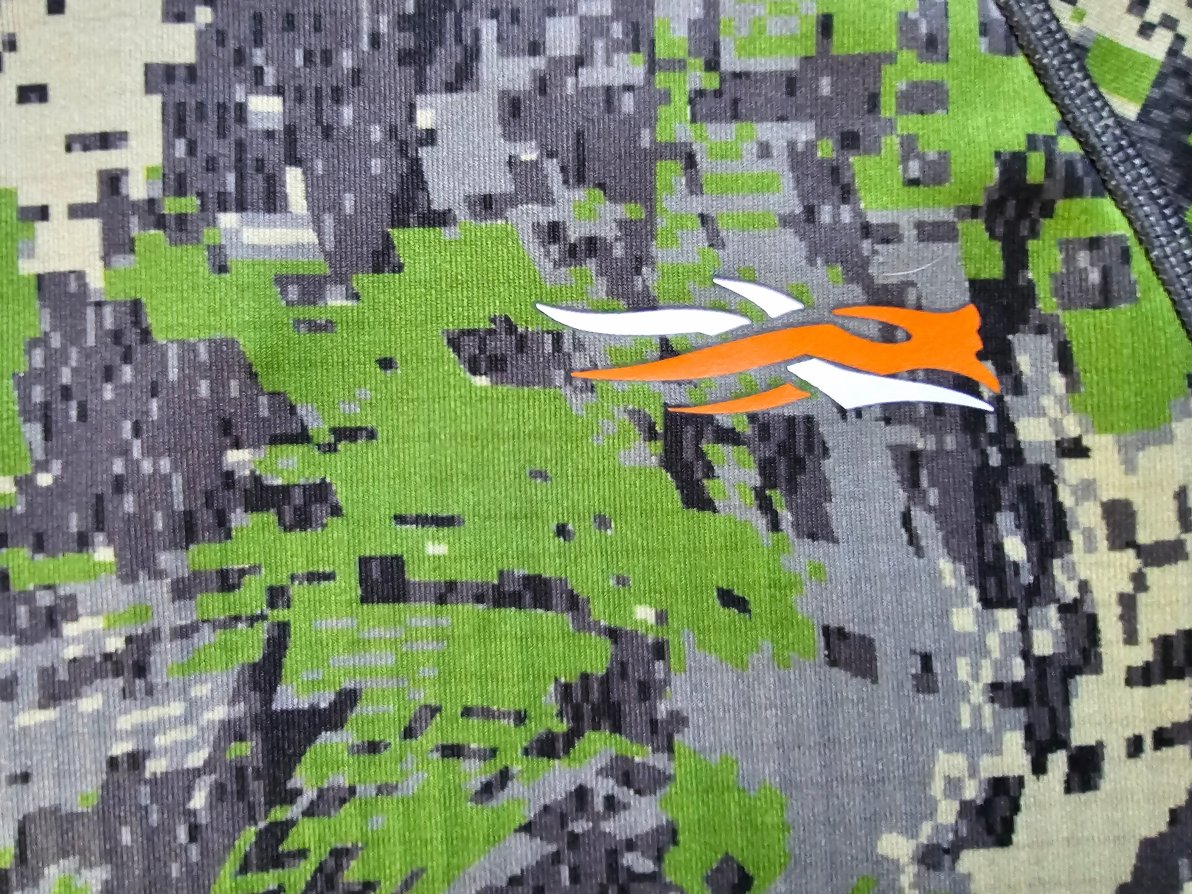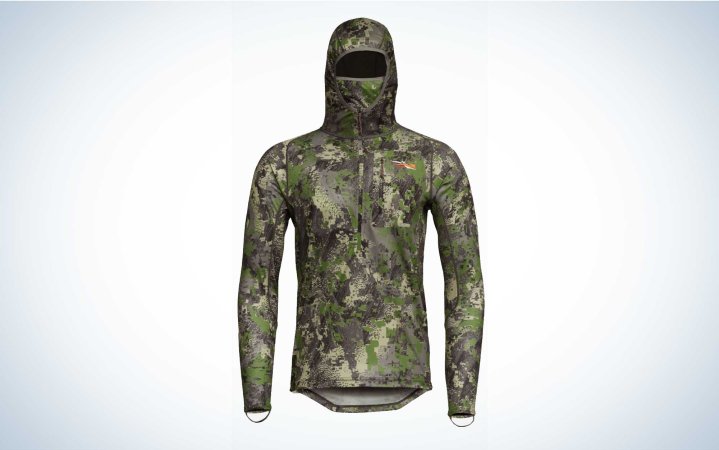We may earn revenue from the products available on this page and participate in affiliate programs. Learn More ›
I’m a firm believer that Fred Bear was right: The best camouflage is sitting still and quiet. It’s tough to get me excited about any new camo design these days. But when Sitka offered me a sneak peek of Optifade Cover, their first new pattern in seven years, I’ll admit that I was intrigued.
As an avid Southern deer hunter, that intrigue turned to eager anticipation when I learned the new pattern was designed to “leverage scientific research with advanced patterning to effectively disrupt the vision of deer and turkeys… particularly in the Eastern U.S.”

Optifade Cover was developed in collaboration with wildlife researchers from the University of Georgia Deer Research Lab to provide an option for better hunter concealment in greener seasons.
I primarily hunt the Eastern U.S. (deer, turkeys, and waterfowl in Edgecombe County, North Carolina) and am a long-time fan of Sitka’s line-up, so when the UPS driver dropped the preview package on my doorstep, I was pretty stoked. Inside the box were swaths of fleece and Polygiene fabric in familiar virid hues mixed with shadowy greenish grays.
“Oh, this looks like home,” I said as I pulled a Sitka hoodie in Optifade Cover from the package.
Science-Based Camo for Eastern Hunters

Sitka developed Optifade Cover by diving into the research of Dr. Karl V Miller, an Emeritus Professor of Deer Ecology and Management at the University of Georgia. They specifically focused on his research revealing how deer see. Most traditional stick-and-leaf camo designs are based on the way humans see the world. Sitka took a sharp turn from that approach with their Optifade patterns. Optifade motifs are designed to disrupt the way ungulates like elk, mule deer, and whitetails see, thereby making it difficult for them to recognize human predators sitting in their natural environments.
Miller was part of the collaborative development of Sitka’s new pattern, which builds on Optifade’s proven foundation and incorporates specialized coloring and breakup elements to better suit hunting environments back East.
Because big game species can detect movement four times faster than humans and have 300-degree peripheral vision, Sitka’s camo designers engineered an original pattern that uses micro- and macro-breakup elements to disrupt the outline of the human silhouette.
But what sets Optifade Cover apart from Sitka’s other patterns is the color palette. Whitetails and wild turkeys have an enhanced sensitivity to ultraviolet light (Game species have a far different photoreceptors and cone distribution than humans). So Sitka based the new pattern on research that focused on the structure of animal eyes. The researchers then used spectrometer testing to ensure Optifade Cover utilizes the perfect shades to match eastern hunting environments.
I caught up with Miller to discuss the new Optifade Cover before I wore it into the woods for the NC archery season opener.
“Optifade Subalpine is designed for early-season western landscapes dominated by open country and mountainous terrain,” Miller says. “Optifade Cover is optimized for the dense vegetation and tree canopy cover environments, primarily in the eastern U.S. It addresses the specific needs of hunters in thicker leafed-out settings where matching the spectral reflectance of the surroundings requires a pattern tailored for more enclosed, densely vegetated spaces.”
That is a very scienc-y way of describing the verdant, leafy green landscapes of my home hunting terrain.
Sitka Optifade Cover Fall Styles
Sitka just released its Optifade Cover Line-up on Sept. 9. Whether you are believer in the camo pattern or not, the line includes a full roster of quality products that are perfect for deer hunters:
- Core Lightweight Crew LS
- Core Lightweight Hoody
- Equinox Guard Hoody
- Fanatic Hoody
- Ambient 100 Hooded Jacket
- Ambient 200 Jacket
- Stratus Vest
- Stratus Jacket
- Fanatic Vest
- Fanatic Jacket
- Traverse Pant
- Equinox Guard Pant
- Stratus Pant
- Stratus Bib
- Fanatic Bib
The company also has limited options in women’s sizes (as well as a huge selection of hats, caps, gloves, and accessories):
- Women’s Core Lightweight Hoody
- Women’s Fanatic Hoody
- Women’s Cadence Pant
- Women’s Fanatic Jacket and Fanatic Bib
A Pattern for the Rest of Us
I got my first taste of Sitka after gearing up for a DIY archery elk hunt in Colorado in 2020. A friend with Western hunting experience suggested I invest in technical clothing that would better match the demands of chasing Rocky Mountain elk than my random clearance rack camo purchases I used to hunt whitetails at home. Wanting to do whatever I could to swing the odds in my favor, I invested in a system from Sitka and carted it across the country.
Unfortunately, I didn’t come home with a bull, but I did return with a deep appreciation for Sitka’s quality gear. I hadn’t realized how miserably uncomfortable I had been all those years while wearing discount gear until I wore my elk-hunting Sitka gear through deer, bear, and turkey seasons in the Southeast. I had accepted misery as a natural part of the hunting game. But dressed in quality gear, I realized that sitting in the woods didn’t have to come with suffering. I was able to stay in the field longer when outfitted in gear that actually fit properly and kept me warm and dry whether I was hiking a country mile or sitting still for hours on end.
There was one problem: Sitka’s Optifade Subalpine camo pattern, the brand’s most versatile pattern and the one I was now wearing in the North Carolina woods, was developed for Rocky Mountain big game hunters. So while my Subalpine Sitka gear looked right at home in Colorado’s Flat Tops Wilderness, it seemed a bit out of place in the deep, green, canopied Southern river bottoms that I hunt 60-plus days a year.

Western hunting can feel like Hollywood here in the South. On social media we watch the hunting community’s superstar celebrities hunt monster elk on alpine landscapes, which can make the hand-me-down back forty here at home seem pretty tame in comparison. It’s no wonder the West seems to get most of the hunting spotlight. And not just on social media and the pages of popular hunting magazines, but also by gear manufacturers who spend serious bucks on product development and advertising. Unfortunately, that effort is aimed more at the average hunter’s aspirations than his actual needs.
There are nearly 3 million hunters in the Southeast, according to the National Deer Association’s 2022 Annual Deer Report. Meanwhile, despite the social media hype and its wide open wild spaces, the West only has approximately 744,000 deer hunters.
Read Next: Let’s Not Forget, the Midwest and South (Not the West) Are the Heartbeat of Hunting in America
The majority of hunters aren’t packing up their Tacomas and heading off into the sunset to hunt those wide open spaces. They are hunting the big woods, swamps, and cutovers in eastern states like Arkansas, Alabama, Georgia, North Carolina, Kentucky, Virginia, and Pennsylvania, which all recorded more deer hunters in 2020 than any state out West.
Opening Day Field Test
I was wearing Sitka’s Optifade Cover when the first morning light hit my treestand opening day. I was right: The color shades in this pattern perfectly match the greens and grays of the woods I know so well. I wore the Core Lightweight Hoodie and Cadence Pant for the morning sit in hot, drizzly weather. I didn’t kill a deer, but was completely surrounded by the wild turkeys that had eluded me this past spring. They fed around my stand for almost 20 minutes and were completely oblivious to my presence. It was a comfortable and enjoyable start to my season.
While I can’t speak for what the deer will think, I felt like I melted into the landscape. There may not be a way to become totally invisible in a lush, shady Southern river bottom, but I suspect this is about as close as it gets.

